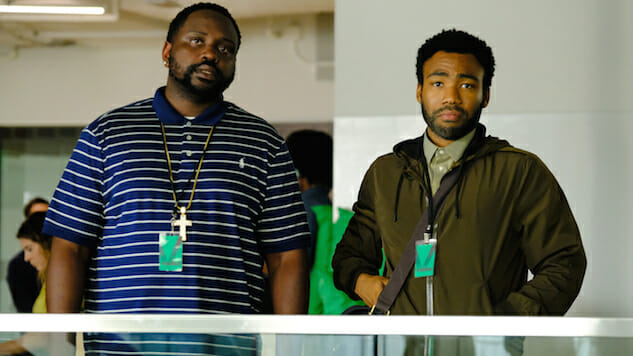Atlanta: Robbin’ Season Is in Full Swing in the Perfectly Calibrated “Sportin’ Waves”
(Episode 2.02)
Photo: Guy D'Alema/FX TV Reviews atlanta
Atlanta’s been riding the wave of bleak comedy for a season and change now, which has allowed its cast and crew to perfect their balance of incredulity and deadpan into an episode like “Sportin’ Waves.” This is an episode where Earn (series creator Donald Glover) functions as an outsider sucked into various bubbles while his cousin Alfred, a.k.a Paper Boi (Brian Tyree Henry), has his familiar bubbles burst. That’s because “Robbin’ Season” is in full swing and everyone—even those closest to you—gotta eat.
When Alfred gets robbed by his apologetic drug dealer/fan, it’s the first in a series of betrayals. If you can’t trust the guy you’ve been copping from for a decade, who can you turn to? Writer Stephen Glover allows every stupid (and hilarious) contingency to bubble up in the not-unfriendly stick-up man’s mind, and director Hiro Murai captures every shot from the right perspective to make the dealer’s threat stick while making his desperation understandable, frustrating, and ridiculous all at once.
Alfred’s showcased in this episode as a man whose worlds are slowly turning against him, whether it’s the continued disappointment that the mid-tier music industry is a white tech-bro world (it ”has a vibe,” as Earn puts it) or that the black neighborhoods his music grew from are ready to sell him out for their fandom. Henry’s weary bloodhound eyes weigh starfuckers and corporate skeeves as equally traitorous to the simple yet honest artistic life he’s trying to live.
But these scams aren’t purely from the outside of the crew. When Earn comes into a small windfall thanks to some Cane Corso puppies the show set-up early last season (a Hail Mary callback that gives the consistently broke Earn some cash in a funny way), the group immediately moves onto another scam as soon as this one comes to fruition. Darius (Lakeith Stanfield, the psychotropic Kramer whose wild card is as enigmatic as he is captivating) may have set up the puppy sale, but the new scam comes from the season’s newcomer.
Alfred’s new roommate/recent ex-con Tracy (Khris Davis, really given a chance to shine in this episode) has a gift card scheme where he can double any amount of cash for use at the mall. He’s also the king of waves, forming some for a job interview that would put Point Break to shame. He’s also got some strong opinions on Bojack Horseman, which is impressive considering that he’s been in jail for who knows how long and he’s living inside of the closest live-action companion to the show.
The pair enact their scheme at the mall, one planned and one unplanned. Earn may have the overloaded gift card, but Tracy’s just taking. Hey, those folks at the mall have a no-chase policy, so he’s just gonna steal (and talk about his plan to steal) right in front of a sales rep who continues offering him excellent customer service. It’s the basic deconstruction of common law and decency, sometimes heard in absurd podcasts like My Brother, My Brother, and Me as a rambling skit, but here put to work at an Atlanta shoe store.
That’s because “Robbin’ Season” can be Tracy taking shoes from a mall or locals stealing the normal pleasures of everyday life (finding a reliable weed guy, for example) away from a public figure. It’s the same selfishness. Even when Earn takes part in the robbing—quickly, because he gets a text after his first purchase that “they’re onto him” and he only has a few minutes to spend $4,000—he’s abandoned in the mall parking lot because Tracy had to abandon his partner in crime for a job interview. The episode’s heists, social and criminal, patch together to make a Coen-like quilt slowly smothering common decency to death.
The Coen brothers’ influence continues with the glorious reveal shot of Tracy’s waves at said interview. The camera comes up from behind his seated head, ogling the hair like Planet Earth ogles the ocean. Then the scene is hilariously and promptly undercut. The comic timing is always quick to slap your mouth while it hangs open gazing at the technical wonder of the show.
Speaking of that wonder, there are two incredible things about Hiro Murai from this episode that must be noted. First, his lighting is consistently groundbreaking. Houses are low-lit and low-key, malls are reflective and uncomfortable, late-night drug deals are pitch-black and sweaty, corporate offices are white and oppressive. Nobody is lighting TV like this, which is why most TV shows don’t look like they live anywhere or are from anywhere. His underexposure and light always remind you that you’re looking at a place, and when those visual elements change, the sense of place does, too.
Second, even when he makes a fake music video (hocking Yoohoo, of all things) to be mocked late in the episode, it still looks inventive and engaging. And at least it’s better than the acoustic white girl cover of Paper Boi that’s the last straw for Alfred. He’s over robbin’ season. As for Atlanta’s “Robbin’ Season”? It’s so good so far that I can’t wait to see where it goes next.
Jacob Oller is a writer and film critic whose writing has appeared in The Guardian, Playboy, Roger Ebert, Film School Rejects, Chicagoist, Vague Visages, and other publications. He lives in Chicago, plays Dungeons and Dragons, and struggles not to kill his two cats daily. You can follow him on Twitter here: @jacoboller.